Sam Altman: How to build a startup team and culture?
- Transfer

Stanford course CS183B: How to start a startup . Started in 2012 under the leadership of Peter Thiel. In the fall of 2014, a new series of lectures by leading entrepreneurs and experts of Y Combinator took place:
Second part of the course
First part of the course
- Sam Altman and Dustin Moskowitz: How and why to create a startup?
- Sam Altman: How to build a startup team and culture?
- Paul Graham: An Illogical Startup ;
- Adora Chung: Product and honesty curve ;
- Adora Chyung: Rapid startup growth ;
- Peter Thiel: Competition is the lot of the losers ;
- Peter Thiel: How to build a monopoly?
- Alex Schulz: Introduction to growth hacking [ 1 , 2 , 3 ];
- Kevin Hale: Subtleties in working with user experience [ 1 , 2 ];
- Stanley Tang and Walker Williams: Start Small ;
- Justin Kahn: How to work with specialized media?
- Andressen, Conway and Conrad: What the investor needs ;
- Andressen, Conway and Conrad: Seed Investment ;
- Andressen, Conway and Conrad: How to work with an investor ;
- Brian Chesky and Alfred Lin: What is the secret of company culture?
- Ben Silberman and the Collison Brothers: Nontrivial Aspects of Teamwork [ 1 , 2 ];
- Aaron Levy: B2B Product Development ;
- Reed Hoffman: About Leadership and Leaders ;
- Reed Hoffman: On Leaders and Their Qualities ;
- Keith Rabois: Project Management ;
- Keith Rabois: Startup Development ;
- Ben Horowitz: Dismissals, promotions and transfers ;
- Ben Horowitz: Career Tips, Westing and Options ;
- Emmett Shire: How to conduct interviews with users;
- Emmett Shire: How Twitch talks to users ;
- Hossein Rahman: How hardware products are designed at Jawbone;
- Hossein Rahman: The Design Process at Jawbone.
Disclaimer: careful traffic (bulk material + lecture slides).
Sam Altman: Idea, Product, Team, Implementation - Part II
Before moving on to the beginning of today's lecture, I would like to take a couple of minutes to answer your questions. In the last lesson, we did not have time for you to ask them, as some of you have already noticed in your correspondence with me. So if you have any questions about what we analyzed the last time, I will be happy to answer you.
Q: Are there any ways to determine the current market growth rate and forecast it, for example, over the next 10 years?
The fact is that students here have a great advantage. You just need to trust your gut. Your older colleagues can only guess what technology young people use, but you can just take a closer look at what you and your friends use. From this point of view, you will have a much clearer perspective than those who are older than you. I would answer this way - trust your instincts. Take note of what you do and what you use. Take a look at what people around you are using, people of your age. These technologies most likely have a future.
Okay, one more question, and let's start today's lecture.
Q: How do you manage to cope with fatigue [orig. burnout - emotional "burnout" - hereinafter approx. trans.] and work productively if available?
The answer to this question can be very simple: "it's terrible, but you need to overcome yourself." In this case, you can no longer hide behind your student body, relieving yourself of the responsibility for getting good grades on exams due to your emotional overload. This is one of the most difficult aspects of working on your own project - you are faced with the real world, and you just need to cope with your problems. A canonical way out of this situation could be a trip on vacation, but this never works in the case of the founders of companies. In any case, all your thoughts will only be about work, although it is not very easy to believe at first glance.
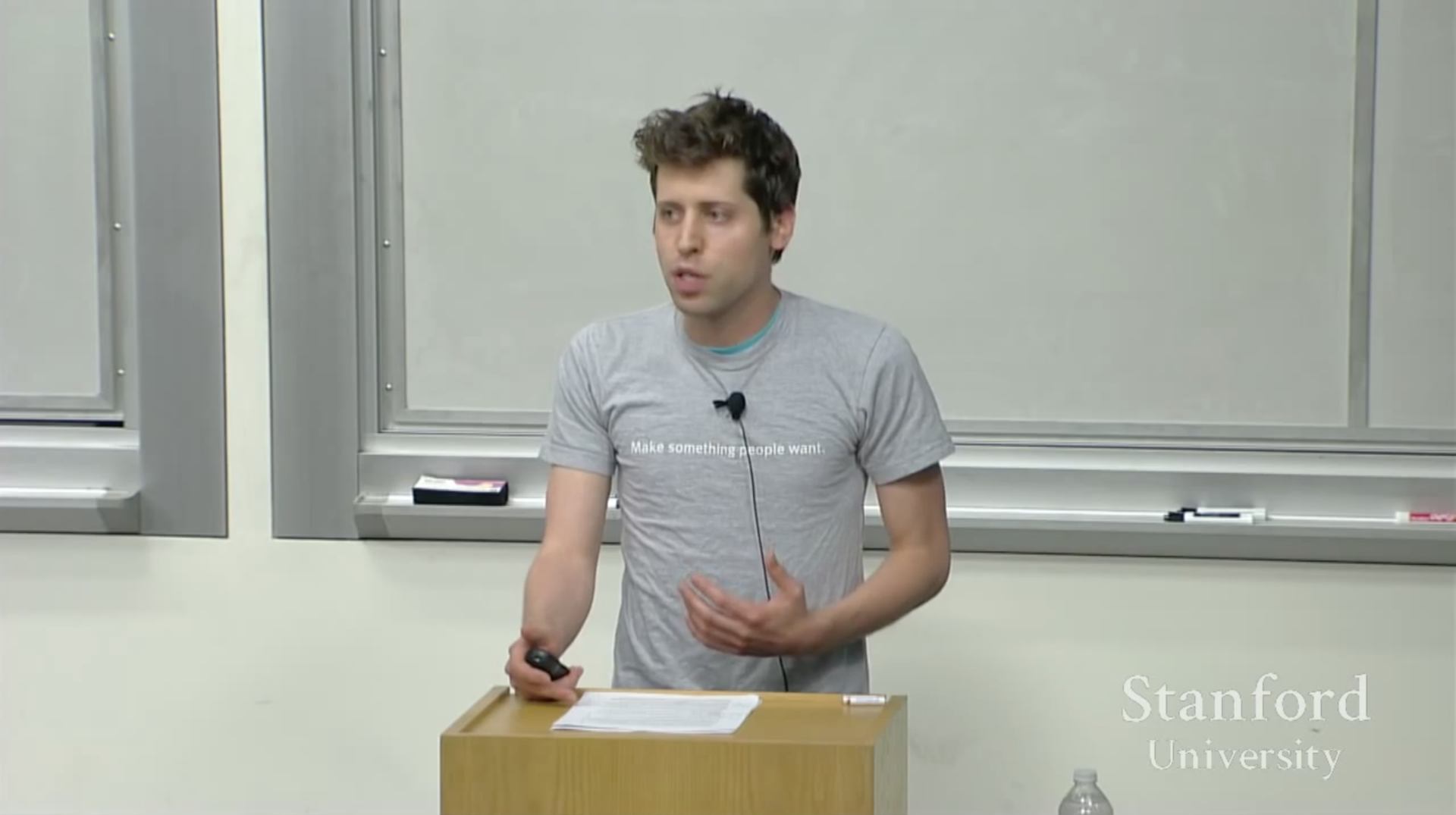
So just pull yourself together.
Of course, the support of colleagues will help you, the significance of which should not be underestimated. The emotional component of the work, let alone depression, is not a joke, and the presence of a team devoted to you in any case will not be superfluous. However, the only way to get rid of emotional fatigue is to identify it and work with what you are doing wrong, in dealing with challenges. Ultimately, this alone will make you feel better.
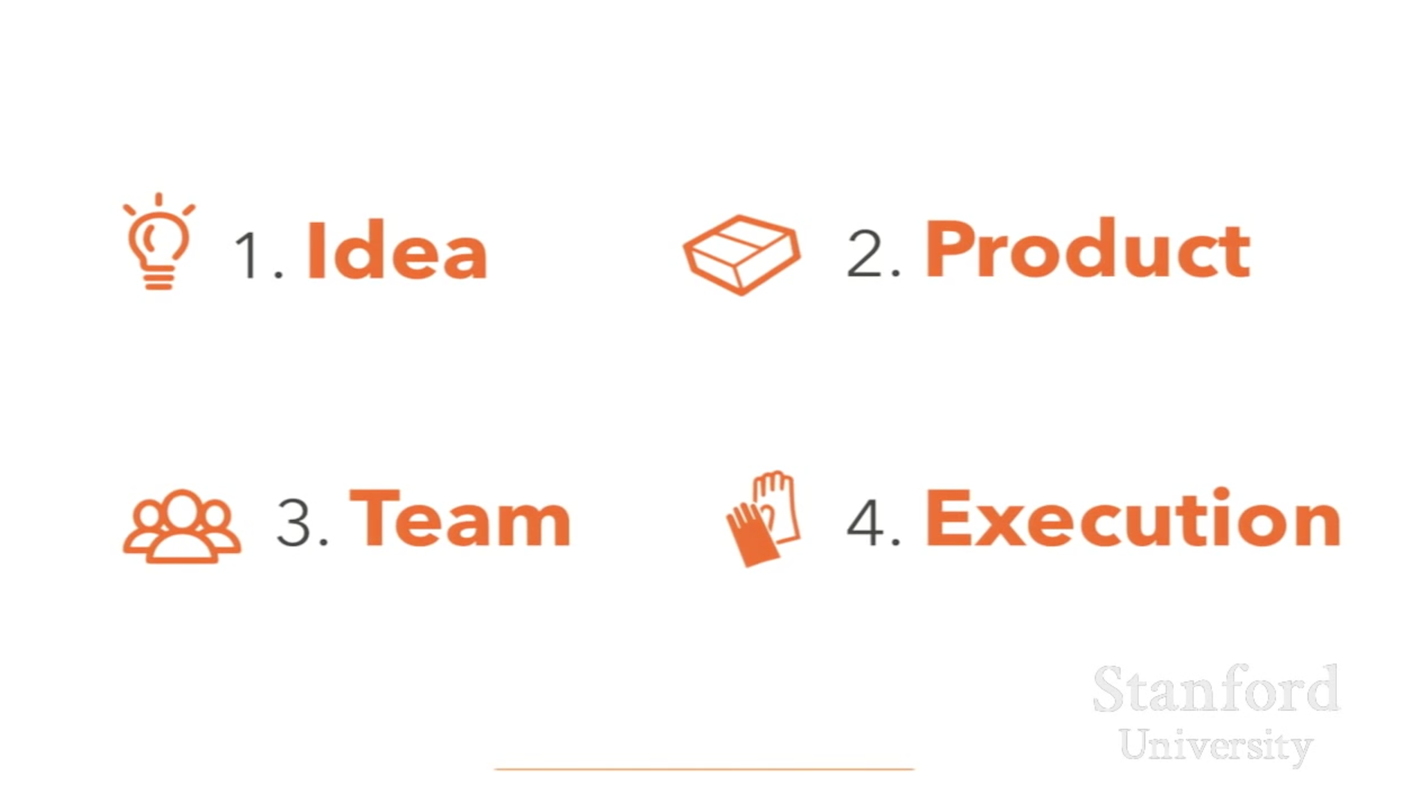
In the first lecture, we discussed working with ideas and a product. I would like to emphasize once again the following: if you fail at this stage, then nothing will save you. Today we will talk about working with employees and the actual implementation of your project. I hope that you will succeed [orig. Hopefully you don't execute the people you hire. Sometimes - a pun based on a word translationexecute in a different context].
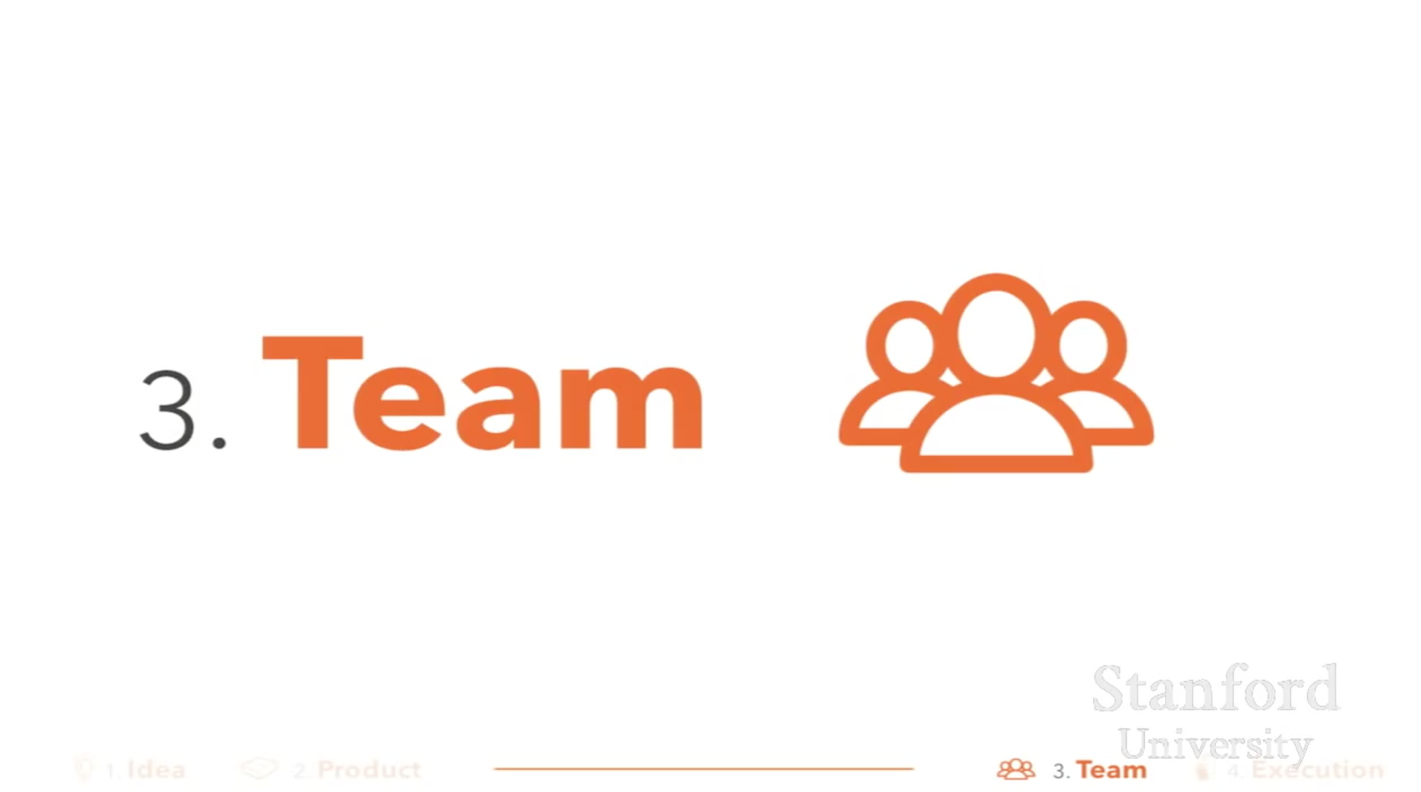
Firstly, I would like to dwell on the co-founders of the company, whose relationships are at the core of the entire business. Usually everyone says that you should pay attention to the signs of incipient tension and immediately work with them. Of course, this makes sense, and in the case of YC residents, the first reason for the companies to cease to exist is precisely the disagreement of the co-founders of the business. However, many still approach the issue of team building much less thoroughly than the issue of hiring employees. Do not even think to do the same! This stage is one of the key moments in the life of your project. Treat these issues properly.
For some reason, this is very difficult for students. They just take the first comers, based on the presence of a common desire to do business. But there are still various kinds of events to get to know your potential co-founders. All this is just crazy. They would not even hire those people who were chosen as co-founders, but nevertheless decide to start working with them on a common cause. This is very, very bad. Whether it is an accidental person, or one whom you know only superficially - usually it all ends in disaster, because in difficult times you will not even have anything to lean on, because you have practically nothing in common.
It’s good if you met with the co-founder of your project in college, but if this did not happen for one reason or another and is not expected, you should just go to work in an interesting company. If you work, for example, on Facebook or Google [well, or on Yandex, or maybe Mail.ru], then you just open a “gold mine” to search for potential co-founders. No worse than Stanford.
It’s better to work without a co-founder than to get along with the wrong person. However, working alone is in any case not the most optimal strategy. Before we started the conversation, I looked at our statistics. Maybe I missed one company due to a hasty calculation, but it seems to me that all the companies from the 20 YC graduates with the most capitalization were founded by at least two people. And, it seems, we invest only in one of ten companies created by the efforts of one sole founder.

So, the best option is the co-founder, whom you know well. Another good option is to work alone. The first one they come across as a co-founder is a terrible option, but nonetheless, for some reason, students often choose it.
Thinking about potential co-founders, it is worth starting from certain criteria. At YC, it is customary to take exceptional resourcefulness as such a criterion, and everyone has heard about it. Your co-founders will really need this quality. There is an even more colorful example that we share at the beginning of the YC program. It was first demonstrated by Paul Graham, and I continued the tradition.

You need calm and persistent colleagues who will be ready to make their own decisions in certain situations. They must act quickly, decisively and be creative in this, be prepared for anything. There is a similar pattern in pop culture. Of course, that sounds a little silly, but well remembered. We are telling this to every set of YC residents, and I think it helps them.

This sample is James Bond. It sounds ridiculous, but you will definitely remember those qualities that will help you in finding a co-founder. And the qualities of James Bond in this case are more important than expertise in a specific field of knowledge.
As I said earlier, the ideal option is co-founders, whom you have already known for years. This approach is also suitable for attracting the first hired employees, and many apply it just in this case, but completely forget at the moment of choosing the co-founders. So take the opportunity to get to know your fellow students better, this is your advantage.
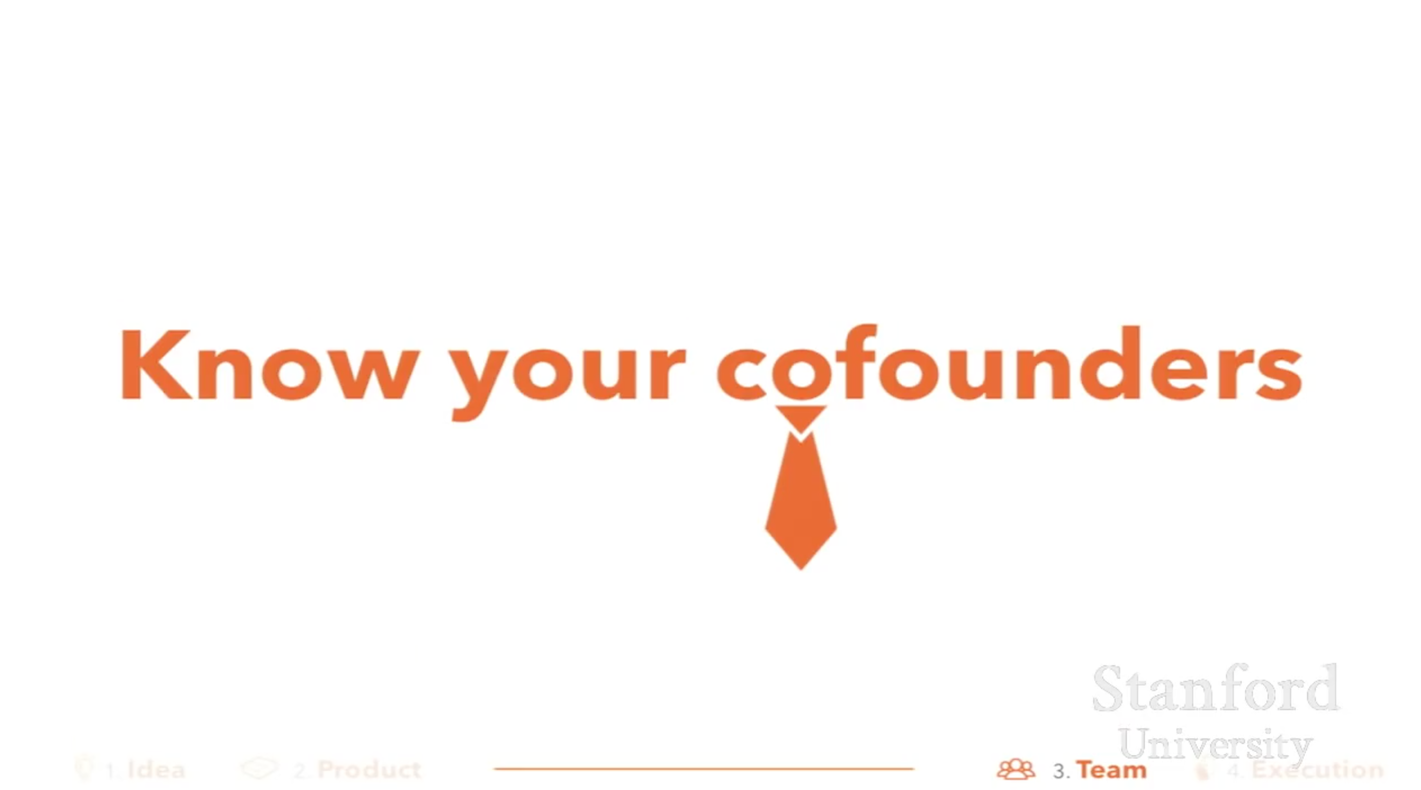
In addition to exceptional resourcefulness, it is worth noting such qualities as stamina and peace. The need for these qualities, as well as the presence of ingenuity, is obvious, but many do not give them sufficient weight. You will need a co-founder with these qualities, especially if yours is not very pronounced.
If you do not understand technology, and even if you understand, you should in any case be considered as a potential co-founder of a person with technological specialization. Replacing such specialists with hired employees is a popular solution today, but rather strange. Everyone is sure that they will be just managers.
Our experience shows that this approach does not work. Specialists in software [software] should be engaged in the corresponding business, and experts in the field of media should work on a project just in the field of media.
We believe that two or three co-founders of a business are the best option. One is not the best, five is just a terrible option. Sometimes it works out for four partners, but it’s better to concentrate on a team of two or three.
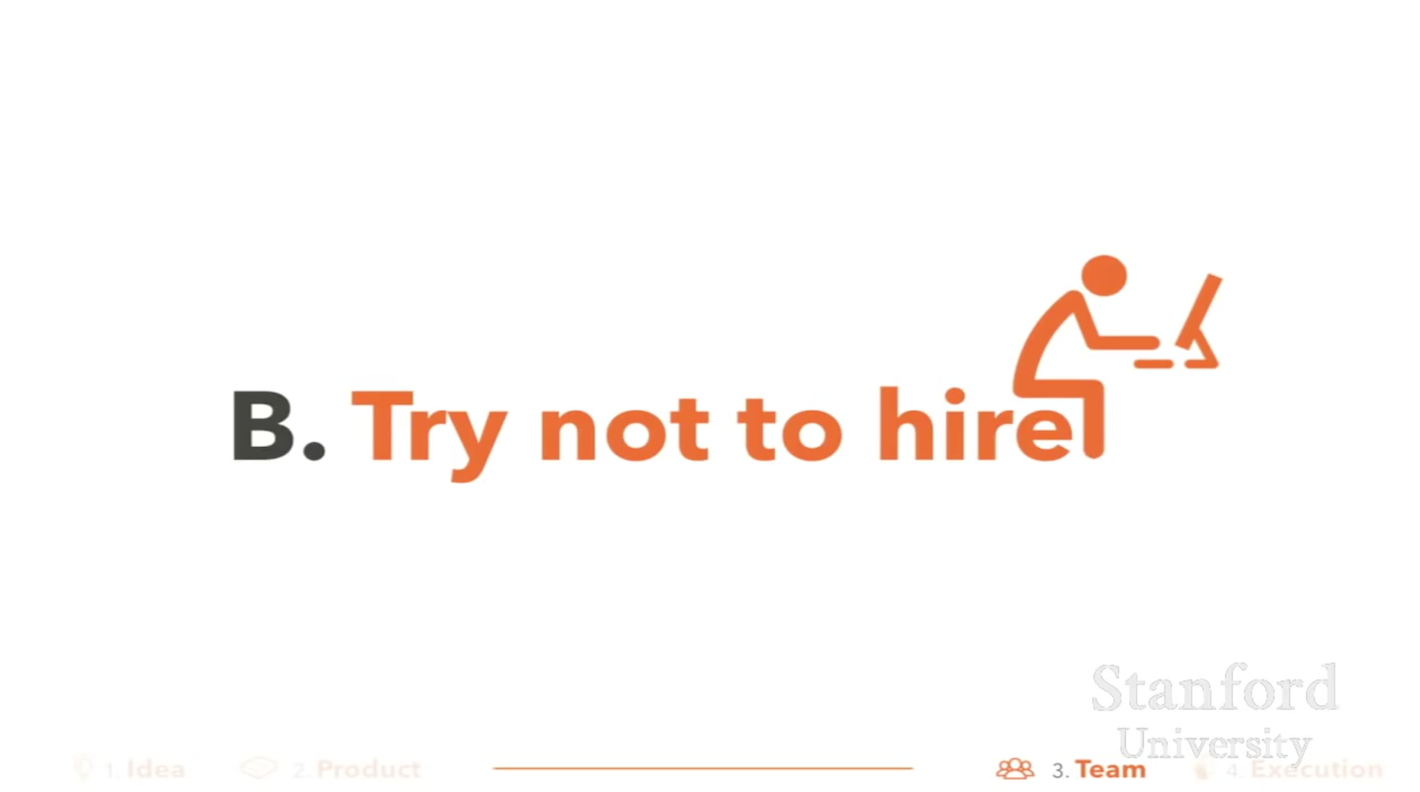
The second aspect of team building: try not to resort to the help of employees. Starting work on the project, you will notice that you will be constantly asked about their number to your team.
According to this metric, your project will try to evaluate for coolness. If you talk about a significant number of employees, everyone will be amazed at the prospects of your business. Otherwise, you will look like a rather pathetic project in the eyes of the public.
However, in fact, the minimum number of employees is a huge plus for the company. Busting their number usually leads to too high spending on wages [orig. burn rate - actually the rate of “burning” of funds], complicating the structure of the company, slowing down the decision-making process, etc.
There is nothing good about it.
You should be proud of the opportunities that you create for your business, attracting a small number of employees to work. Many residents of YC just excelled in this as part of their first year of work. Some did not resort to hired labor at all. Try not to expand your team as much as possible. At an early stage of work, hiring employees should only be as critical as necessary. During the development of your business, you should learn to do it quickly - be able to scale it, but at first it’s better not to hire employees.
One of the reasons for refusing "mercenaries" is the high probability of an error when choosing a candidate for work in your company. In fact, as my experience with many teams shows, such a mistake at the first stages of the project development simply kills the whole business.
The guys from Airbnb interviewed the first employee of the company for as long as 5 months. In the first year of their work, they hired only two. Before hiring the first, they made a list of qualities that they would like to see with their first employee. One of the necessary qualities was a complete immersion in the Airbnb business. They did not hire those who would not be ready to devote themselves all to the business of the company.
To illustrate Brian Chesky, director of Airbnb, who is strict about this issue, I can say that he even asked people about their decision to go to work at Airbnb in the event of a fatal diagnosis. Starting, it seems, with one year as the remaining life time of a potential employee, he gradually moved on to 10 years, taking into account all the frenzy of his question. However, he still asks this question.
The approach to hiring employees is really important, because these people will be called upon to determine the essence, appearance and future of your company. You will need those who believe in it almost as much as you do. Of course, Brian’s question sounds crazy, but he managed to develop a culture of incredible dedication. It is this culture that helps to unite the company team in difficult times for it. For example, during a crisis at the initial stage of business development, the entire company actually lived in the office - they worked on the product and improved it until they overcame the local crisis.
It is surprising that the first 40 (or so) Airbnb employees feel personally involved in the founding of the company [in fact, in the literal and figurative sense].
The high level of requirements and the lack of rush in the selection process of employees is the guarantee that they will believe in the mission of your company, working with you.
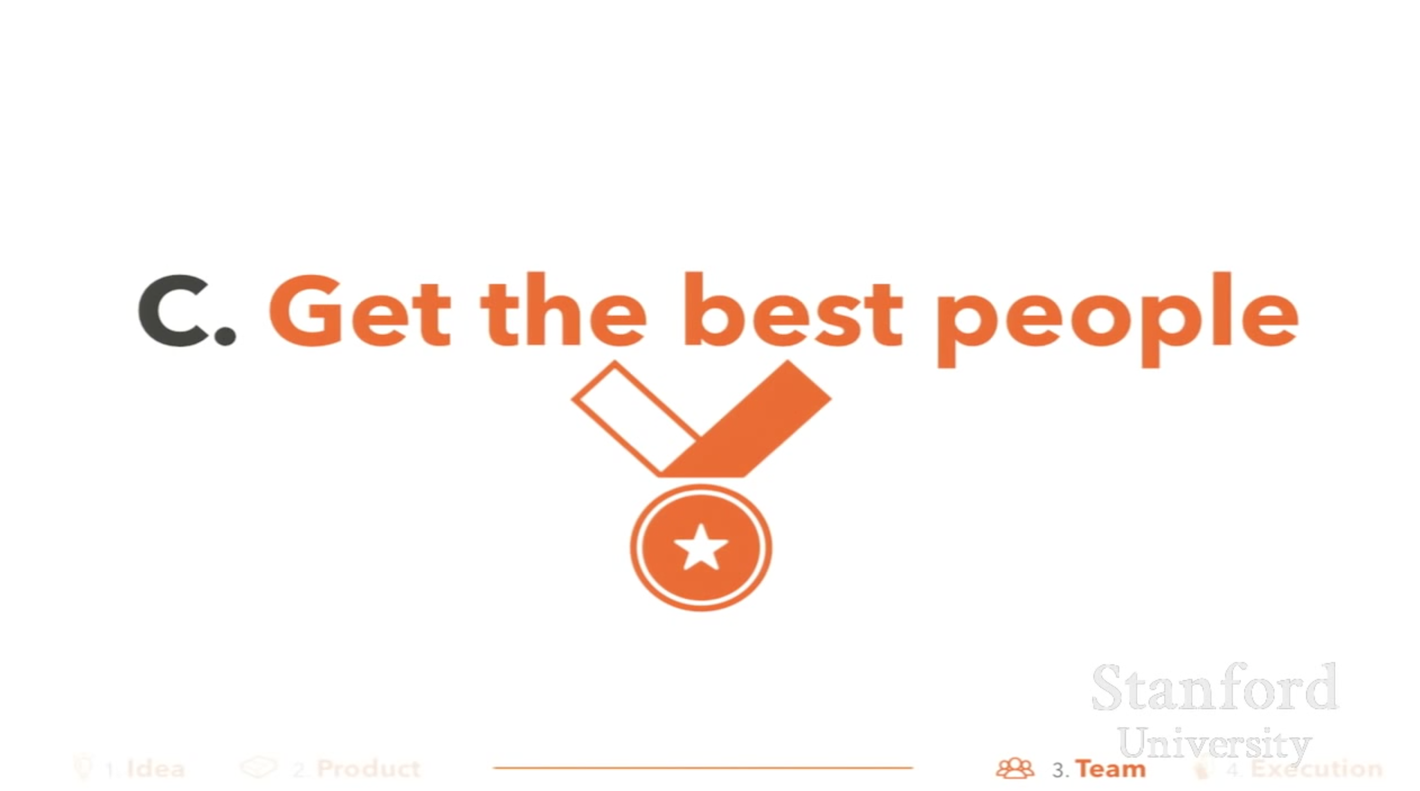
Suppose you took into account the hiring remark only when the critical need for such a step. With the onset of such a need - you can not be distracted by any other tasks except the selection of the best candidates. As with the hard work on the product, your main priority is the product, so in the process of attracting investments, priority should not be shifted to other tasks than attracting investments.
Founders of companies often underestimate the complexity of the recruitment process. It seems to them that the genius of their ideas will serve as a magnet for volunteers. Of course, all this works in a completely different way. Due to the fact that the most talented candidates have the opportunity to choose their place of work among a large number of companies, their involvement will take time, sometimes up to a year. This is not a very fast process, in which you will need to convince them of the greater importance of your company's mission compared to the rest.
This only confirms the importance of working on the product and its quality. Masters of their craft always want to take a place in the crew of a spaceship, and not anything else.
I always advise those wishing to join the startup team - to choose just a spaceship - a company that is already working hard, but almost no one sees its potential. In addition to you, a person who has carefully examined this company.
Good specialists understand this very well and will not rush to join the team of your company. First of all, they will try to make sure that you are on the right track.
This morning I was asked a question about the amount of time that should be devoted to the selection of potential employees. I would say that you should devote from zero to a quarter of the time that you spend working on your project. At the same time, either you do not hire employees at all, or it takes the maximum time segment compared to other tasks.
Actually, management literature speaks of allocating 50% of the time to select “mercenaries,” but the authors of this conclusion themselves rarely even spend 10% of their time on such tasks. In any case, 25% is a significant time, and approximately the same amount should be spent on solving personnel issues.
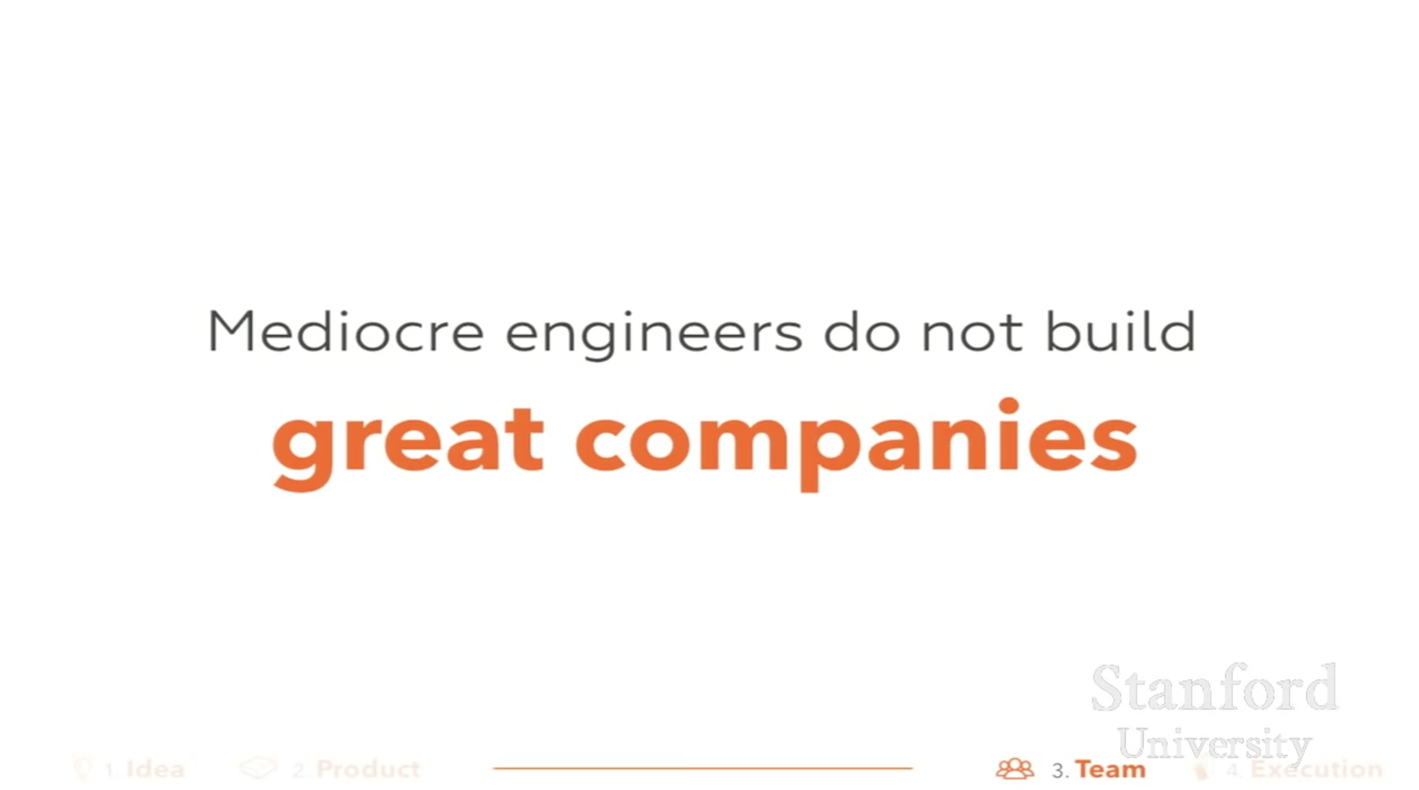
Compromise or mediocrity is your enemy in this matter. We always talk about this, but few are fully aware until he himself steps on this "rake." Mediocrity is a quality that destroys a company’s culture. In large companies, it can cause serious trouble, but not kill the company itself. As part of a small startup, the result of its impact is much worse.
As an example, I’ll say that one of my friends even installed a special sign in the meeting room, which he uses, including for conducting interviews. This sign reads:
“Mediocre engineers don't create great companies.”
In a large company, you can still somehow fight this, but in a startup, absolutely everyone sets the tone for work. If you make a mistake at the stage of hiring the first 5-10 employees to work in your company, the likelihood of killing your business increases significantly.
Can you put the future of the whole company on a single employee? Thus, it is worth approaching the selection of each of the candidates at the initial stage of development. In the future, as the business grows, a compromise is possible due to circumstances. In the framework of subsequent classes, our experts will just talk about the intricacies and differences of the theory and practice of working with personnel. However, at the beginning of the company’s work, it’s worth remembering all this and avoiding failure.
Sources where candidates come from.This is another thing that students often interpret incorrectly. The best source for hiring employees is your social circle, people you already know and people other employees of your company know. The first hundred and more employees of most successful technology companies were selected based on personal recommendations. Most of the founders, despite the awkwardness, turn to all their friends whom they consider suitable candidates and ask their employees to do the same. If you worked on Facebook or Google, you would know that in the first few weeks you will certainly be interviewed by an HR specialist who will force you to name all smart people from your environment, so that you can subsequently hire one of them.
Personal advice is the key to hiring employees.
Another approach is to search for candidates outside the Valley. Trying to hire local techies is a thankless task, but you probably know people who live somewhere else and would like to work with you.
Experience and how important its presence among employees is another question that the founders often ask us. Short answer: experience is important for some posts and less important for others.
When you hire someone to manage a large part of your organization, perhaps the candidate’s experience will play a significant role. But for most of the posts that you close in the early stages of a startup’s life, experience is usually not that important — you should pay attention to the candidate’s abilities and his faith in what you do. Most of the best employees I have ever hired had never before held the required positions. Therefore, you should ask yourself how important is the experience in hiring an employee for a particular position in reality. In most cases, especially in the early stages of a company’s life, you will come to the conclusion that the candidate’s experience is not important to you.

There are three things that I pay attention to during the hiring process:
- How smart is the candidate?
- Does he bring things to the end?
- Is he interesting as a person?
And if, receiving his answers, I can answer all three questions in the affirmative, then I do not regret making a decision. Almost always, this approach works. You can find answers to all these three questions already at the interview stage, but the best way to answer them is teamwork. Therefore, ideally, someone with whom you worked before is suitable for you - in this case, an interview will not be required.
If there are no such candidates, then I think the best way out of the situation is to work with the candidate on the project a day or two before hiring him. You both learn a lot - most of the founders who did not have experience in creating companies are very poor interviewers who, at the same time, can very well evaluate someone by working with this person together.
So, one of the tips we give at YC: try to work together on a project instead of an interview.
If you intend to conduct an interview, and you most likely want to do this, ask the candidate to tell in detail about his past projects, instead of letting him solve puzzles. This way you will learn much more about your candidate.
For one reason or another, young techies like to give puzzles to candidates, instead of asking a person what he has already done in his life. Carefully study the projects that the potential employee worked on. Ask for recommendations. This is another thing that inexperienced founders often overlook.
You need to call the people your candidate has worked with before. And during the call you need to not only ask how the work on the project went - you need to ask about something and besides this. Ask the interlocutor if your potential employee belongs to 5% of the people whom the interlocutor was most comfortable working with. What exactly did this person do? Would your interlocutor recruit him?
I emphasize once again: focus on the request of recommendations.

Another point that I noticed when communicating with companies from YC is that the developed communication skill correlates with successful hiring of employees.
Previously, I did not pay due attention to this. We’ll talk about why communication is so important in the early stages of a startup’s life. If it’s hard to communicate with someone, if someone cannot clearly state their thoughts, the likelihood that this person will be able to work effectively will be extremely low.
In addition, as your first employees, you will probably want to see people who can demonstrate their ability to take risks. In one way or another, they already have this ability - otherwise they would not have shown interest in working in a startup, but now startups are a kind of fashion trend, so pay attention to people who really like to take a little risk.
If someone chooses between working in your startup and McKinsey, it is highly unlikely that this person is really going to work in a startup.
You also need those who are obsessively obsessed with your idea - and this is slightly different from a calm attitude to risk. So you should look for a combination of these qualities.
There is a famous test from Paul Graham called Who are you in the animal world? The point is that for each of your employees, taking into account the work that he does, you must choose the equivalent from the animal world. I don’t know if this can be adequately translated from English, but you need unstoppable associates. unstoppable]. You need those who will finish the job to the end. Founders, happy with their first hired employees, typically describe them as the best professionals in their field.
Mark Zuckerberg once said he was trying to hire those:
- with whom he would be comfortable communicating outside of work,
- and who would be pleased to report to him if the roles had changed.
I think this is a very good model. You do not have to make friends with each of your employees, but you should at least be pleased to work with them. And friendship does not add up, then you should at least deeply respect them. And again, if someone is not very interested in you, then you do not need to try to do something about it.
As soon as I talk about hiring, I would like to pay attention to the topic of distribution of shares in the company between employees. The founders do not pay due attention to this issue.
I think, as a rough estimate, you should plan to distribute approximately 10% of the company between the first ten employees.
Be that as it may, they must earn this share in four years, and if their business goes uphill, they will bring the company much more benefit. They will increase the value of the company many times, and if this does not happen, then after four years they will no longer be in the project.
One way or another, founders usually very sparingly distribute shares in the company between employees. Moreover, they are very generous to investors. I think you need to do the opposite. It seems to me that this is one of the most common mistakes of the founders. Employees will add value to companies over time. Investors, as a rule, simply write out a check, and then, despite the mass of promises, do not fulfill them. Sometimes they do it, but it is your employees who remain the ones who have been working on the construction of your company for many years.
Therefore, I am sure that it is necessary to bargain with investors for reducing their share and be as generous as possible with employees. Companies in YC do just that, those who show particular generosity to their first employees are most successful in the future.
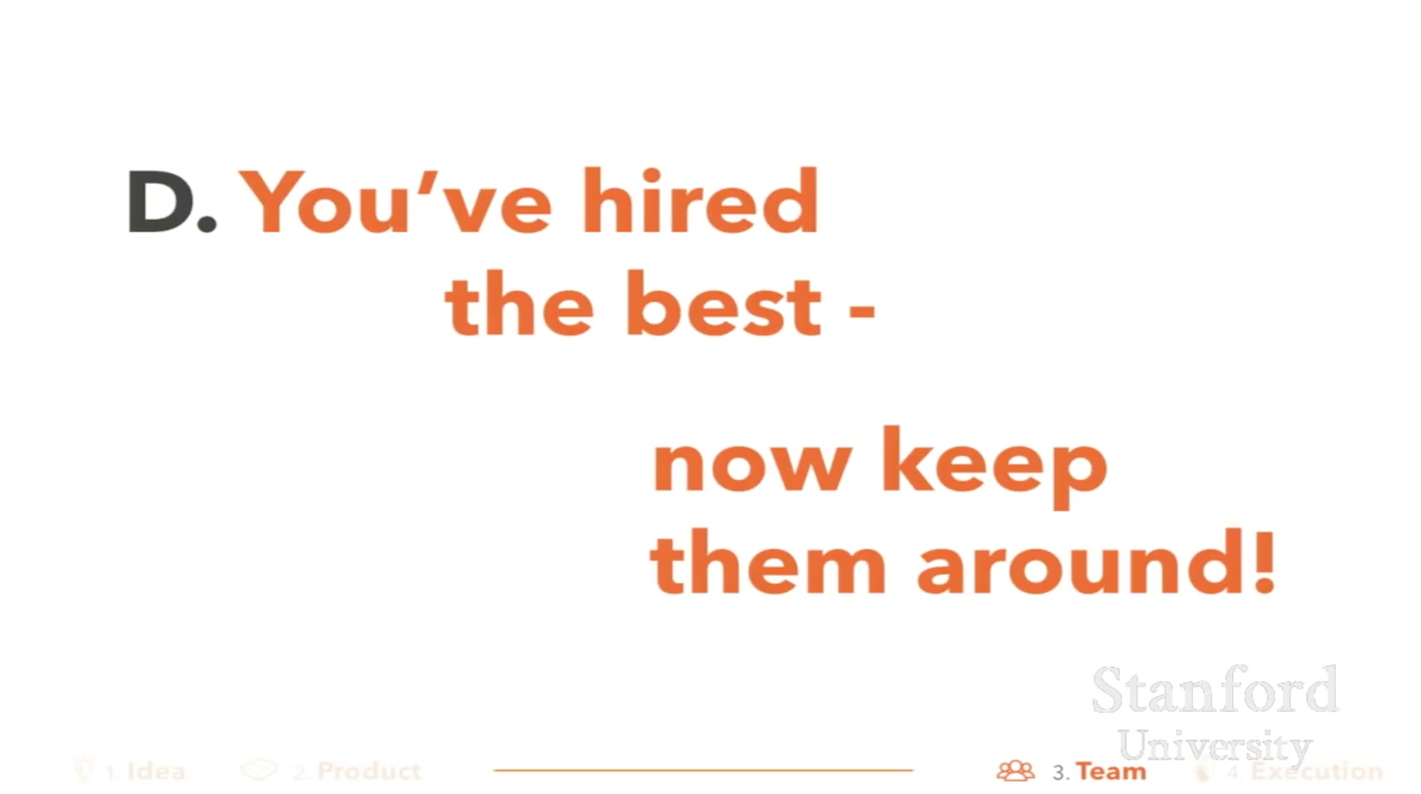
Founders often forget about the need to retain the employees they hired. Here I will not go into details, because later we will devote a whole lecture to it, but I really want to devote a couple of minutes to this, since this moment the founders also very often lose sight of.
You need to be sure that your employees are happy and feel their worth. This is one of the reasons why the distribution of shares in a company between employees is so important. At first, people are euphoric from joining a startup team, but days and years of work pass, and if employees feel an unfair attitude towards themselves, this will put pressure on them and as a result will result in a feeling of resentment and indignation.
Here is another important point:By acquiring at least a minimum of management skills that newly-minted CEOs, as a rule, do not possess at all, you are ensuring yourself a good backlog for the future. This summer one of the entrepreneurs performed at YC, who achieved fantastic success, despite the fact that at first his project had to overcome a lot of difficulties and change his team several times. Someone asked him what was his greatest difficulty, and he said literally the following:
“You should not constantly tell your employees that they are not coping with the tasks if you do not want them to leave you, because otherwise they will do just that.”
However, if you are the founder of the company, then this is your natural reaction. You think that you can do everything better than anyone else - in this state it is easy to tell people what they are doing in a bad way. If you learn a little management principles, you can protect yourself from changing the whole team.
Most entrepreneurs are also not very used to praising their team from the bottom of their hearts. I also had to spend time learning this. You must allow the team to take into account all the merits and achievements, and leave yourself the responsibility for all the failures.
You need to learn not to constantly interfere in the affairs of your employees - instead, give people the opportunity to take personal responsibility for a small area of tasks. The founders usually do not think about this. I believe the best thing you can do as a beginner in project management is to understand that you will be a very poor manager and try to compensate for this shortcoming.
Dan Pink believes that there are three things that motivate people to do their job as best as possible: autonomy, competence, and goal-setting.
I never thought about this when I ran my own company, but I realized this later and came to the conclusion that Dan was right. I think you should think about it too. In addition, I did not immediately learn how to give employees clear and concise feedback and let them perform tasks on their own.
All these are things that managers, as a rule, forget about without a project experience. Perhaps I can protect you from insufficient attention to them.

The last part of my story about the team is devoted to the dismissal of people when all of the above does not bring results. Whatever I say here, there will always be someone who cannot complete the tasks as expected. And the reason I'm talking about this is because firing people is one of the worst things about running a company. According to my personal experience, this, I would say, is the worst moment.
Each newly made founder waits until the last, and everyone hopes that the employee will change. But the right decision in this matter is to dismiss quickly as soon as the tasks cease to be carried out. It will be better for the company. And so it will be better for the employee. But it is so painful and terrible that at first everyone is trying to do otherwise.
In addition to dismissing those who are not doing their job properly, you should dismiss:
- those who create office policies
- and those who always spread negativity.
All other employees are constantly afraid of people belonging to these two categories. For your team they are a burden, their presence negatively affects the entire company. This is another example of what might be in the order of things for a large company (although I could argue here), but it will surely kill a startup. Therefore, take a closer look at such people.
So, the question is how to maintain a balance between firing people and creating first-time employees a sense of security?
The answer is this: there is a difference between an employee who is not doing his job and an employee who is mistaken once or twice. Anyone can make a mistake once or twice, or even more, and you know that you should treat such people with understanding, not blame them for this and try to remain a team, work together.
However, if someone makes the wrong decision all the time, you need to act, and at this stage, the action will be a painful warning for everyone. Dismissal is not the result of a couple of mistakes, it is a consequence of a situation in which an employee makes decisions that are exactly the opposite of yours. You do not need to make decisions for your employees, but you must choose those who really will be capable of this. And if someone makes mistakes all the time - if this continues for a long period of several weeks or months, you will know about it for sure.
This is one of those cases when in theory everything sounds quite confusing, but in practice there is practically no doubt. There is a difference between a person who makes a mistake once or twice, and a person who doesn't do anything the way they need, causes problems and upsets the whole team - everything will be painfully obvious to you as soon as you come across this.
When should co-founders decide on the distribution of shares in the company?
For one reason or another - I still don’t understand, because of what exactly - a lot of founders and co-founders like to put off this issue. They even sign the merger documents in such a strange way as to leave the discussion of this issue “for later”.
This is not a question that will become clear over time. Ideally, these things should be discussed at the earliest stages as soon as you start working together.
And the shares should be approximately equal. If you are not ready to give someone - your co-founder - an approximately equal share in the company, you should think about whether you really want this person to become your co-founder. In any case, it’s worth trying to resolve this issue before things go too far. For example, in the first few weeks.
The next question (lack of experience in this area is quite acceptable): how to find out that someone is going to sit out all the way due to past merits?
And he will not even try to grow to a new position, so that in the end the situation may become critical. Really smart people who are able to learn new things will almost always find themselves a new role in the company as it grows and develops. You may have to push them to new knowledge and skills that they did not work with in their original position.
You can appoint someone at the head of the development team, but when this team grows to 50 people, this person will not be able to manage everyone, and you will have to appoint him to another position. Good people can find a great place in the company - I rarely came across a situation where the search for a new position within the company would become a problem for a talented employee.
Therefore, the next question is: what happens if (on the other hand) your relationship with the co-founder collapses?
In the course of the following lectures, we will have a session on the mechanics of working on the co-founders relationship, but the most important thing you need to understand is that the relations between the founders go bad. This means that every co-founder, including you, is obliged to use vesting.
First of all, hosting for co-founders involves the creation of an agreement, under which it is prescribed what happens if one of the founders leaves the project. In Silicon Valley, standard vesting (4 years) is the norm - this means that if, for example, you distributed shares in a ratio of 50:50, it would take you four years to become a full owner of your share. And the countdown begins only after the first year of work. So, if you exit the project in a year, you get 25% of your share, if you leave the project in two years, you get already 50% and so on.
If you don’t do this, and your project will face serious difficulties, and one of the founders decides to leave it, having a share in half the company, this will put a dead weight on your system of distribution of shares and reporting - it will be very difficult for you to find investors who agree to finance you or do something else.
Therefore, advice number one, with which you can prevent this: use vesting when sharing shares.
Now we are unlikely to finance a company in which the founders did not share their shares with the help of hosting, because this is a very, very bad signal for us. Discuss this as early as possible, do not allow yourself to postpone the adoption of this decision - such discussions take place between co-founders in almost every company.
If you have to compromise between hiring an employee and leaving clients to a competitor, what will you choose?
If this is one of the first five employees in the company, I would prefer to lose customers. Better to lose a few customers than to kill an entire company. At later stages, I would probably change my mind a little, but here it’s hard to give universal advice.
I would like to come back to this later.
Consider the following question: what if co-founders work remotely?
Answer: do not allow this. I am skeptical of remote work, but in the early stages of a startup’s life, when the communication and speed of its implementation outweigh everything else, video conferencing simply cannot provide all the needs of the project. You don’t have to look for examples: remember, say, 30 successful software companies and name at least one among them, whose co-founders would be in different places - it will be very, very difficult for you [well, we will recall, for example, Basecamp].

So, now we will talk about the implementation of the project. The implementation of the project for most founders is not the most fun part of the company, but the most important. Many co-founders believe that if they subscribe to their wonderful idea, they will immediately appear on the covers of magazines and become regulars at parties.
But in reality, the whole essence and meaning of your work, the true meaning of the co-founder’s activity, is that you sign up for years of work on your product and its improvement - and you cannot delegate these tasks.
One of the ways to build a company that creates a quality product is to work efficiently and efficiently. Everything that happens in a startup is tracing the behavior of its founders. Everything that the founders do becomes a corporate culture. Therefore, if you want to create a culture of serious attitude to work, attention to details and communication with customers, moderate expenditure of company funds - do it yourself accordingly.
There is no other way. You can’t hire a COO to do all this while you travel to conferences. The company needs to see in you this image of a manic-tuned machine for the implementation of the project. As I said in the first lecture, there are one hundred times more people with great ideas than people who can make efforts to implement these ideas in a quality manner.
Ideas alone do not cost anything, only implementation adds to them what forms true value.
An important aspect of all this is a simple application of effort, but there are many approaches through which you can succeed in this matter. We will have three lectures fully devoted to this topic.

So, the topic is CEO.
I am constantly being asked what the CEO’s job is. There are about five tasks that a CEO should perform in the early stages of a project’s life. The first four tasks that come to mind when it comes to CEO work are:
- vision development
- fundraising
- working as an evangelist in relation to the people you are trying to hire, performers, partners, the press, everyone around,
- as well as hiring and managing a team.
And the fifth task is to set the bar for the entire process of working on a project. And this is not the task that attracts the majority of founders, or the solution of which they dream, but, I believe, this is in fact one of the critical roles for the CEO, and no one except him can work on it.
Questions on the implementation of the project can be divided into two blocks:
- what you need to do
- and can you bring it to life.
Now I would like to talk about two parts of the question - how to get the necessary result, assuming that you have already decided what you want to do. These two parts: attention and intensity. Attention is a critical thing. I really like to ask the founders what they spend their money and time on. The answer to this question contains almost all the considerations of the founders about what is important to them.
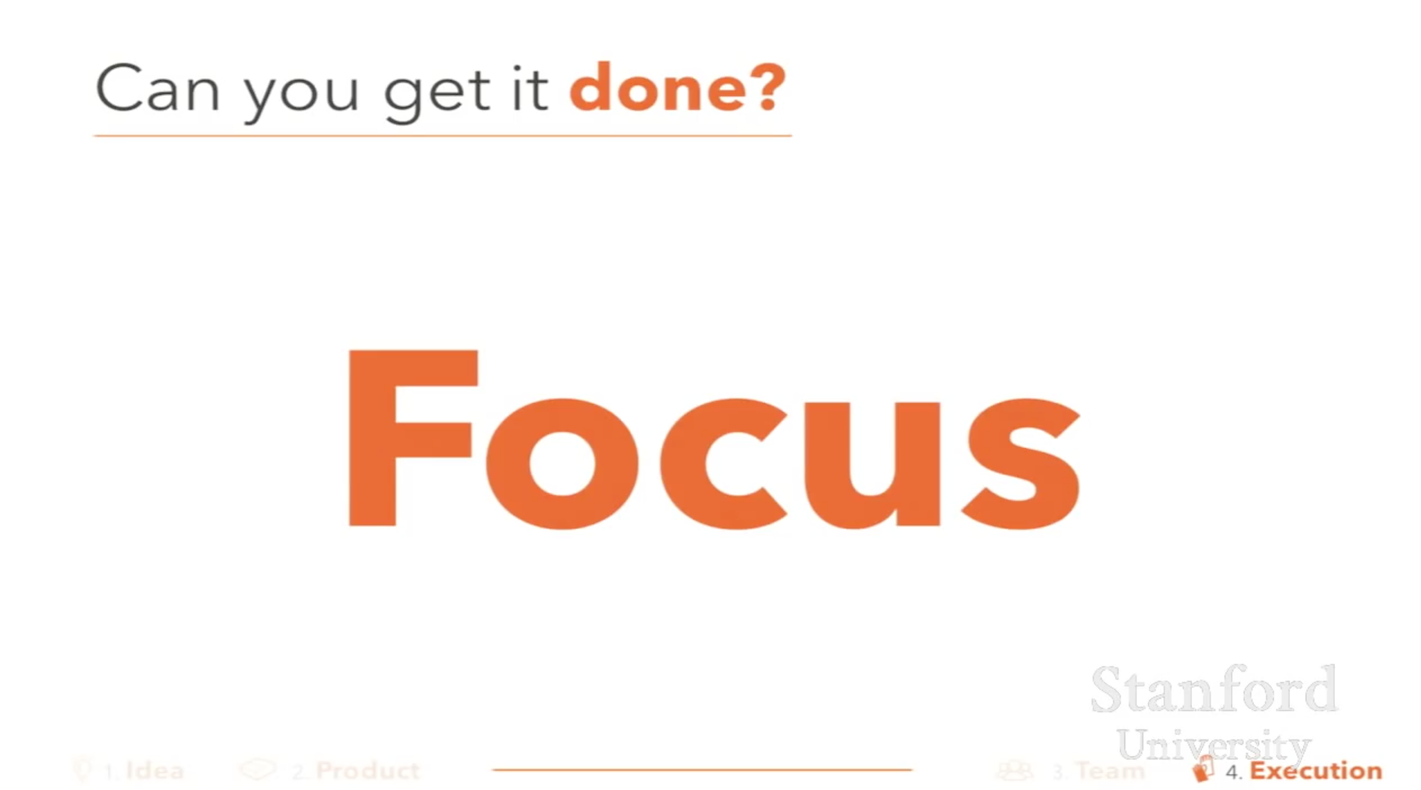
One of the founder’s most difficult tasks is to understand that hundreds of important things fight for your attention every day. And you need to identify the two or three most important ones, work on them, and then ignore, delegate, or put off the rest. Many of the things that the founders consider important, such as talking with representatives of law firms, attending conferences, hiring consultants, anything else like that, don't matter.
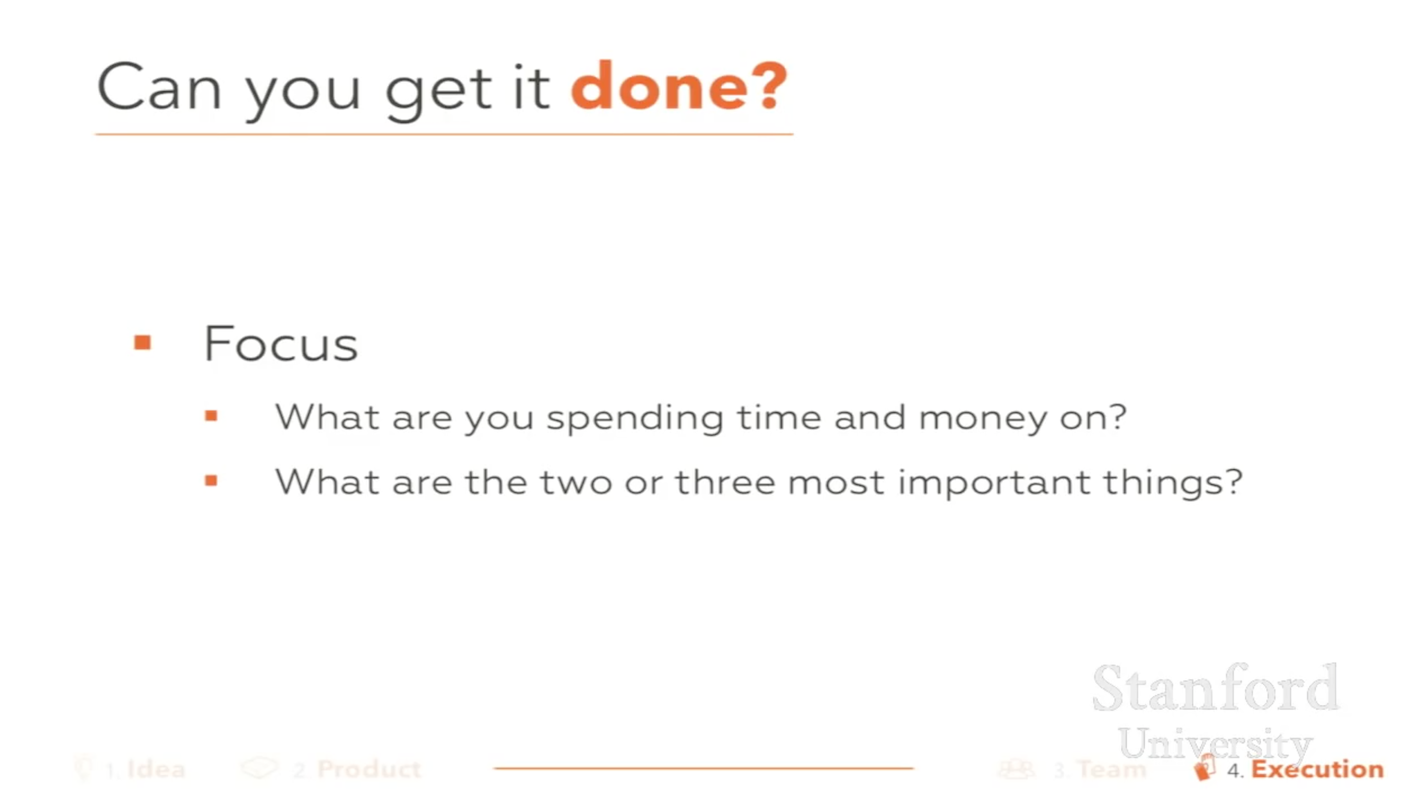
Things that matter at different stages of a company's life may vary, but it is important to understand which two aspects are most significant at the current stage. And deal only with them.
In a day, you can only do two or three tasks, because the rest of the time you will be engaged in a daily routine. Unexpected situations will occur every day. And if you do not define two or three priority tasks for yourself, you will not be able to complete things. This skill is given to the founders very hard - they are inspired by new tasks.

Unfortunately, the path to success is through the ability to refuse. You will say no in 97 out of 100 cases. Most entrepreneurs find that they need to consciously make an effort. Many startups are very far from this degree of concentration. They work a lot, but they don’t do the things they really need, so they still fail.
One of the great and terrible truths about how to create a startup is that you won’t get anything for trying to do something. You earn points only when you do what the market wants. Therefore, if you work hard on what the market does not need, nobody will care.
The question is how to understand what to focus on every day. It is very important to set goals for yourself every day. Most of the successful founders with whom I am familiar form a number of small goals that cover all the affairs of the company, which all team members are aware of.
Such goals may include, for example, delivering a product by a certain date, achieving specific growth rates, hiring employees for these key positions - at any time, each team member can tell what these goals are. And everyone builds his work with these goals in mind.
The founders set the direction for the whole team. Whatever the founders care about, no matter what they focus on, this will become the direction of the entire company. The best founders repeat their goals to themselves again and again, much more often than, in their own opinion, they should need it. They hang posters on the walls, talk about them in personal meetings with team members and in weekly meetings with the whole company.

And this allows the project to stay on course. One approach to determining the direction of their development is that concentration is unattainable without effective communication (which is why co-founders who are not friends often encounter difficulties). Even if you only have four to five people in your company, a small divergence of opinion and a lack of communication will lead people to start working on slightly different tasks. And then the concentration is lost, and the company has to get out of this unpleasant situation.
I’ll talk about this a bit later, but development and growth are what you simply can’t stop concentrating on. These are the things through which the startup lives, and you must constantly support them. You should be constantly aware of how your real indicators compare with metrics, every week you need to review the work done - you should seriously worry if you want to say:
- “Now we are not growing very fast, but we are busy with other tasks”
- “We do not have an X supply schedule because we are focused on other matters.”
- “We are doing rebranding and so much more.”
This almost always leads to disaster.
So, you need to set the right metrics, and you should focus on growth relative to these metrics and maintaining growth rates. Do not let the company be distracted or carried away by other things. The mistake of most companies is that they are too fixated on their own promotion. It is very easy to do promotion, which does not give any results, but at the same time gives a sense of self-worth. If you do not achieve anything in a year, it will not be so cool, especially if you continue to think only about last year’s articles, in which your startup is called a new breakthrough, despite the fact that you have not done anything new.
As I said, put together a team in one place. Remote work within a startup is very, very difficult. It slows down your development more than anything else.

Work hard. A friend of mine told me that the secret to a startup’s success lies in its exceptionally clear commitment to its goals and exceptional dedication. You can work in a startup and in addition to do something else, for example, a family, but you cannot work in a startup and do a lot of other things. A startup is not the best choice to strike a balance between work and personal life - this is a harsh reality. Startups have a lot of good things, but that's not their forte. This is such an all-encompassing activity that its scale within your life is difficult to even put into words, because in the first place you need to strive to work more competitors.
The good news is that a little extra work on really important things leads to radical changes for the better. I like to give an example of a viral factor for custom web projects. How many new users does one existing lead to? If this indicator is 0.99, the company will eventually wither and die. And if it is 1.01, you will find yourself in a zone of continuous exponential growth.

This is a concrete example of the fact that between success and failure lies only a small concentration of effort. When we talk with successful entrepreneurs, they constantly tell similar stories. Their success was ensured by the fact that they simply worked a little better and more than competitors.
You should concentrate well. The key persons in this matter are the director and founders of the company. The main advantage of a startup is the speed of product implementation, and you just need to learn how to maintain a relentless working rhythm.
The famous slogan of Facebook says: "Develop fast and in spite of everything." However, they do not forget about quality.
This is the whole complexity of this issue. Maintaining speed or quality is not so difficult, but combining both indicators at once within a startup is not an easy task. You should take care of creating a culture within which everyone in the company will focus on achieving the highest level of quality with a fairly fast pace of work.

Apple, Google, and Facebook are doing very well. And here the matter is not so much in the product, but in everything that these companies do. They develop rapidly and contrary to everything, they are thrifty where necessary, but always care about quality.
Having bought bad computers, and the program code you will receive the appropriate one.
High quality standards must be maintained in all aspects of the company. This will also contribute to your determination. Her absence kills startups. The mediocre founders spend a lot of time discussing grandiose plans, but they have not taken concrete steps. Here only the tendency to decisive action saves.
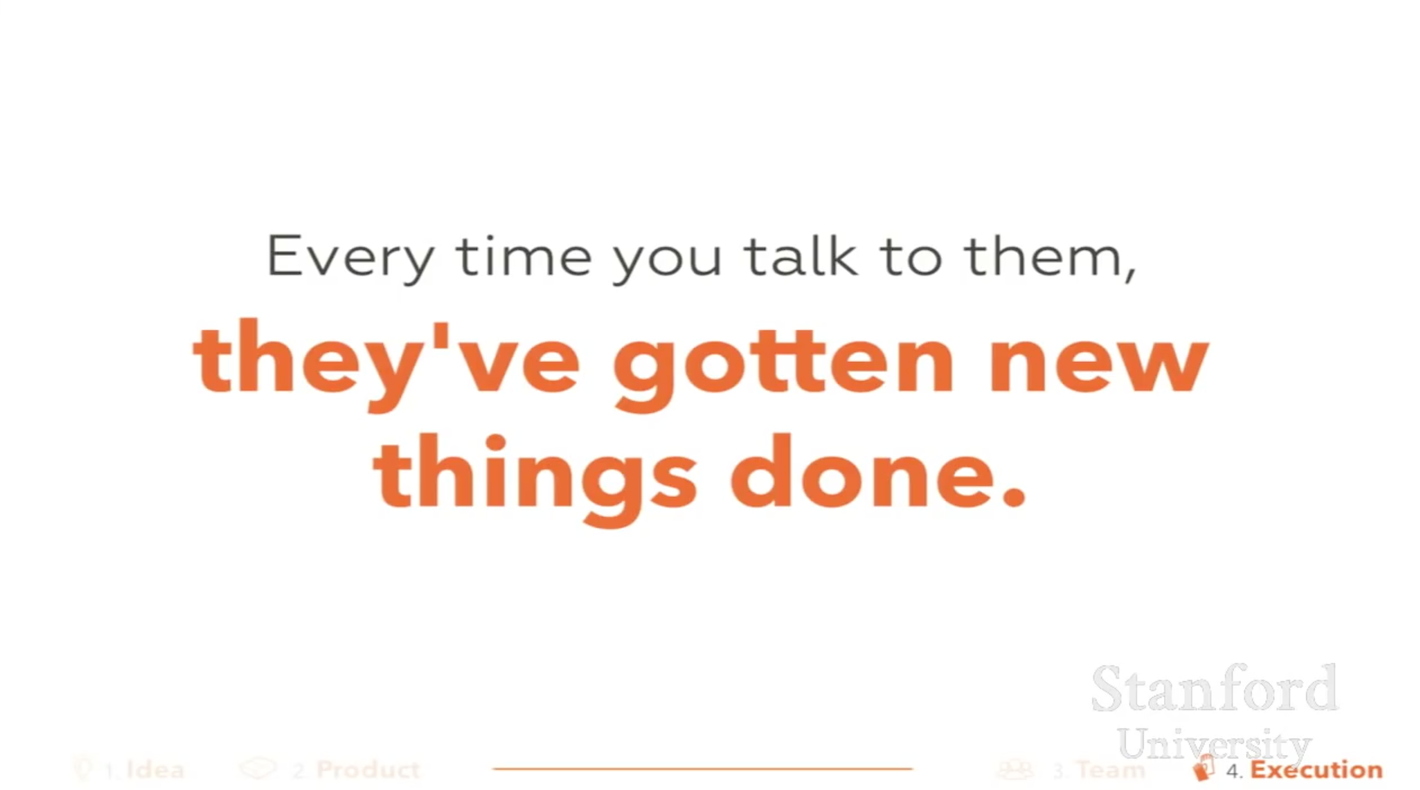
The best founders in their field work on trifles, as it may seem from the outside, but these projects are developing really quickly. Every time you meet them, they have already done something new. Just this criterion is a good predictor of success in the framework of YC. If at each meeting with the team we learn about the successful solution of new problems, then we can talk about the harmonious development of this team.
The fact is that you can cope with significant problems by breaking them down into small tasks. Solving such problems in turn, for example, throughout the year, you will not even notice how to “turn the mountains”. On the other hand, if you simply disappear for a year with the determination to return at one point with a ready-made solution to all problems, then you may not really hope for something surprising.
Thus, you should measure the amount of work required for the implementation of a project. Even if you are working on a crazy project in the field of synthetic biology, and it takes you a whole year to get things moving, then in this case you can try to break up large tasks into more compact ones.
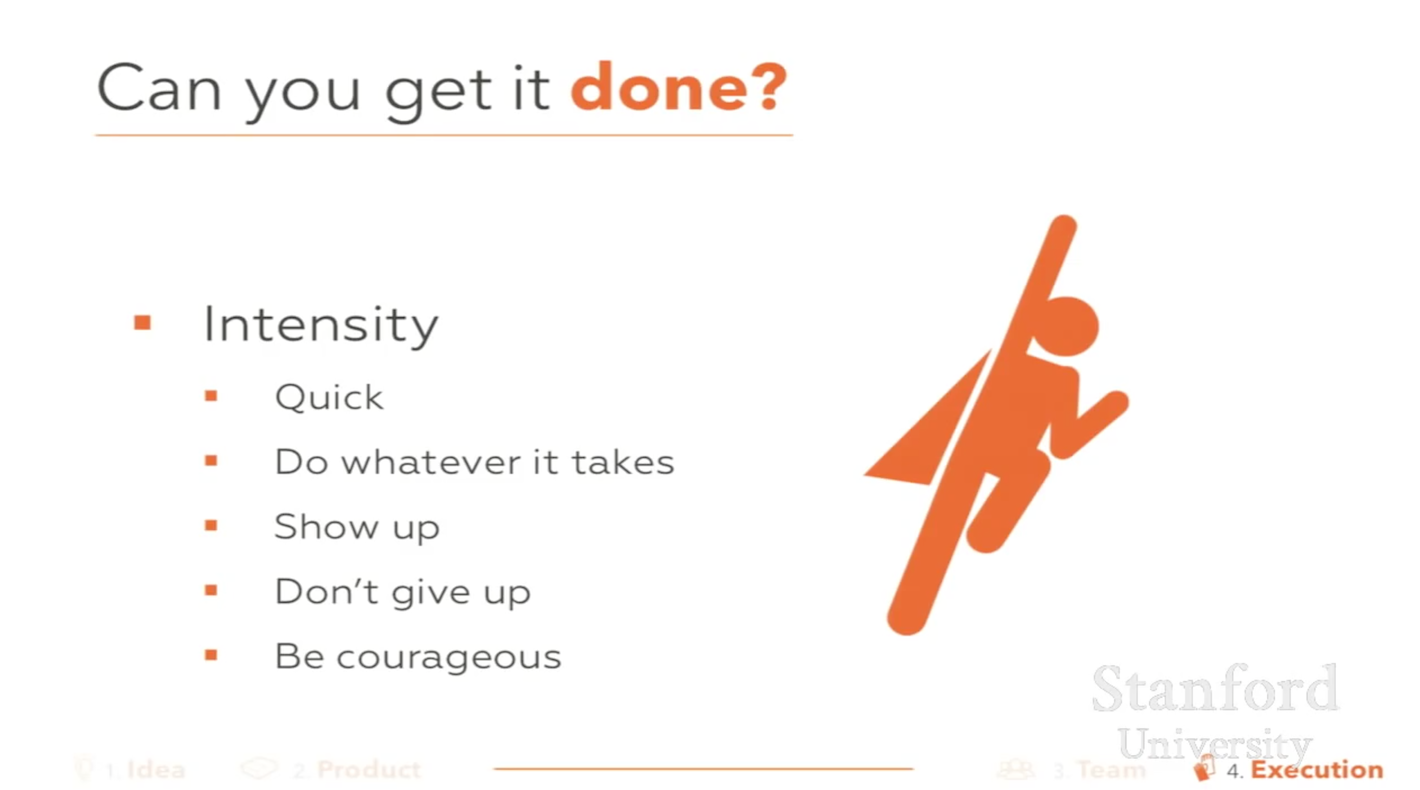
Speed of work is one of the key qualities. Successful company founders usually respond very quickly to letters and make decisions quickly. Plus, they are ready to develop at all costs.
They are always in place at the right time. Be it meetings or something else - they always participate in face-to-face discussions.
The following rule has always worked for me: to board a plane and seek a personal meeting if a critical situation arises somewhere. Let me tell you a little more about this.
Once, when I was working in my own company, we realized that we were about to lose the opportunity to close the deal. The deal itself was quite significant, because it implied cooperation with the largest customer in our area. The contract has almost gone to another company that entered the market a year before ours. Everything was under their control.
We called the customer and said literally the following: "Our product is better, we need to meet." To which they gave the expected answer: "Tomorrow we will sign a contract on this issue, sorry." We went to the airport, got on a plane and arrived at the customer’s office by 6 am the next day. While there, we refused to leave the office and asked someone from the customer to speak with us. In the end, one of the junior employees listened to our offer, and then we met with his senior colleague.
It all ended with the severance of the customer’s contract with another company and the conclusion of this transaction with us literally next week. I am convinced that an exclusively personal presence has helped us resolve this situation in our favor.
So, speaking about the importance of personal communication, many cite a similar example with an airplane, but the point is not in actual flights, but in the essence of the approach itself. As a good illustration, I brought this story.
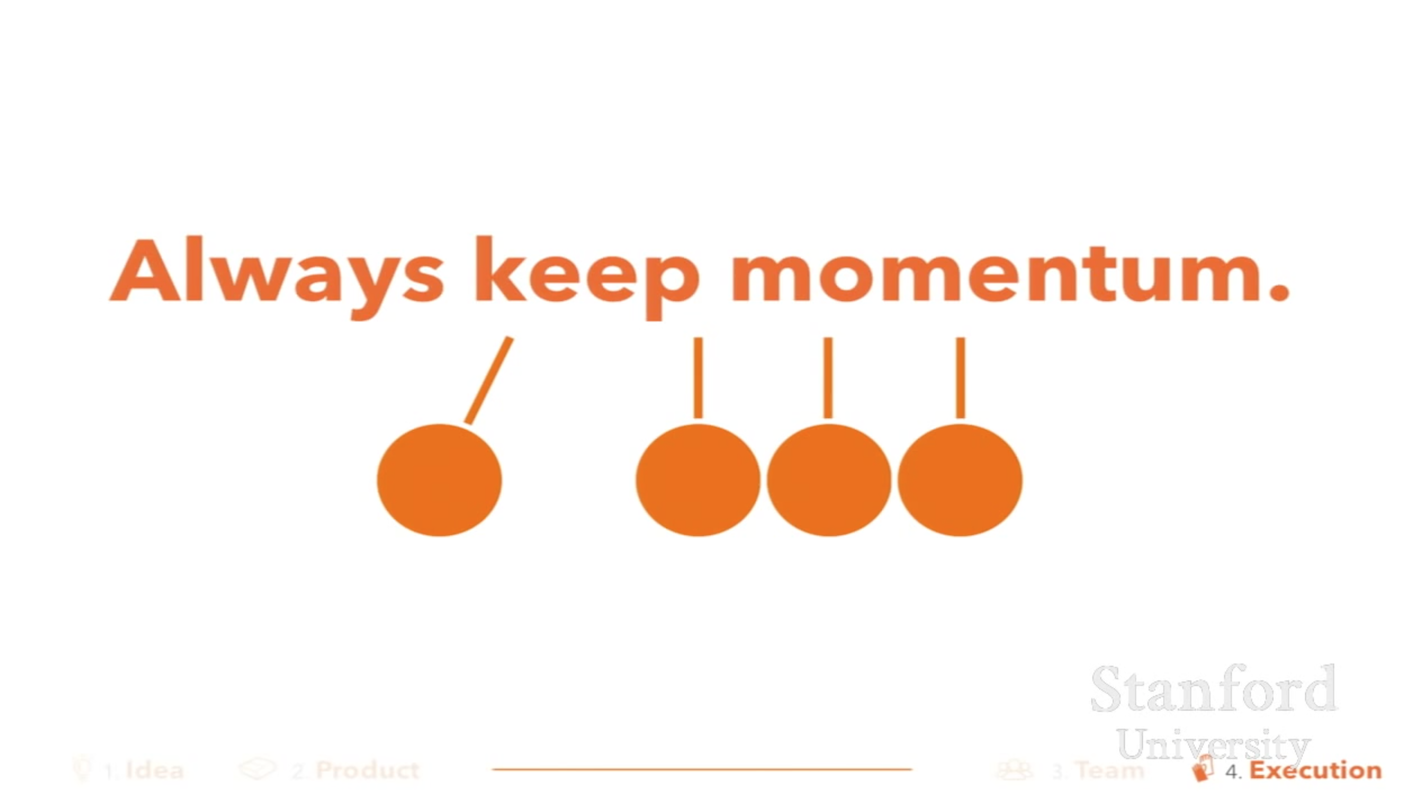
I already spoke about the driving force and growth of the business, but I will emphasize once again the fact that startups are the lifeblood of them. Successful implementation just depends on these factors. Your company should always be at the peak of opportunities, and if you take your foot off the gas pedal for at least a second, everything will get out of control and turn into a snowball of problems.
Победители подпитываются победным духом и продолжают побеждать, а проигравшие постоянно сталкиваются с отсутствием мотивации и проигрывают снова и снова.
Always pay attention to the driving force of your business. This is a key aspect in working on a startup. And if you give advice on the topic of company management, then the founders should pay attention to this.
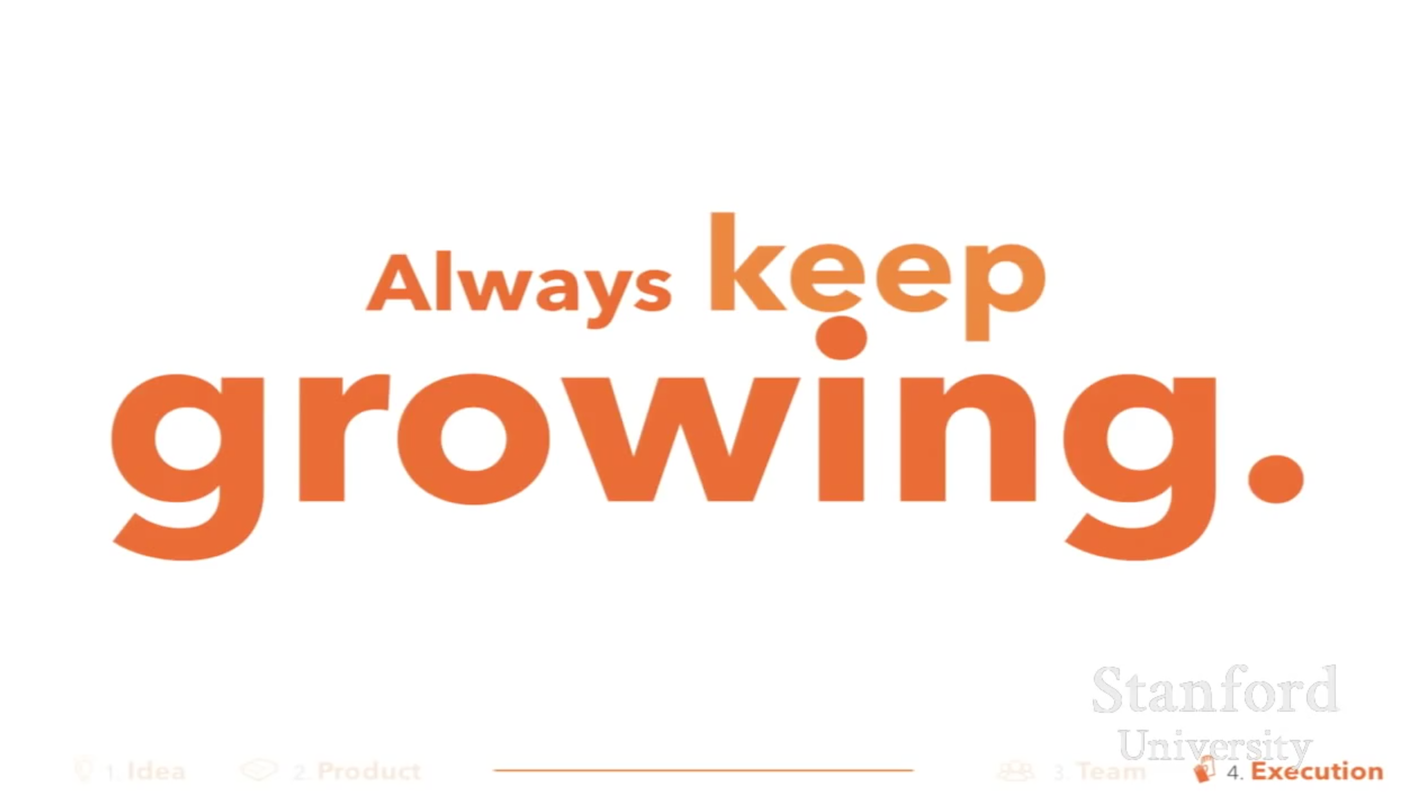
For most software projects, this thesis translates into a demand for continuous growth. For start-ups that manufacture physical objects, for example, gadgets, a requirement is to comply with the delivery schedule of products. We talk about this with YC resident companies, they listen to us, and everything is going well. At the end of the YC program, their concentration is dispersed on a number of other issues, and company growth is slowing. Realizing this, many lose their motivation and leave projects. Everything just falls apart.
Of course, it’s quite difficult to develop some kind of universal “growth engine”, because ever new approaches to achieving business growth are constantly appearing, but there is one fundamental point: if you make a good product, then the business will grow. The concentration of efforts on the product at the initial stage of work will allow you not to lose the business growth rate in the future.
In the case of a loss of growth, many are trying to immediately compensate for them, but they are not doing it very well. They concentrate on long speeches about the vision of the company and try to close up all the holes with their own sayings. However, employees who feel a slowdown in business growth are not inclined to listen to such presentations.

Vision ballads should be reserved until the moment when you start to win one victory after another. While things are different, you need to try to win at least local victories.
One of my colleagues says that sales help to cope with almost any problem in a startup. He is absolutely right. You should identify those areas where you could quickly achieve your goal, and you will not have time to blink an eye, as all problems will disappear on their own.
In times of slower growth, you will also encounter disagreements regarding the further actions of the team. In such cases, it is worth contacting your users, using their opinion as an alternative to endless disputes within the team. You must constantly remind people that there is no personal hostility between you, even if something does not work as you would like, you just need to pull yourself together and everything will work out. The very recognition of this fact will help you in solving problems.
Используя пример Facebook в очередной раз, скажу, что в момент замедления роста компании в 2008 году Марк [Цукерберг] учредил специальный отдел, в обязанности которого входило разрешение данной проблемы. Ребята из этого отдела концентрировались на работе над небольшими задачами, которые могли бы повлиять на рост всей компании. Хоть отдел и состоял из небольшого числа сотрудников, но кривую роста Facebook им вполне удалось выправить. Вместе с этим вырос и статус самого отдела. Марк назвал его одной из наиболее инновационных находок компании. Как говорят мои друзья, работавшие в то время в Facebook, этот отдел действительно изменил динамику роста всей компании кардинальным образом. И увядающий коллектив компании снова обрел дух победителей.
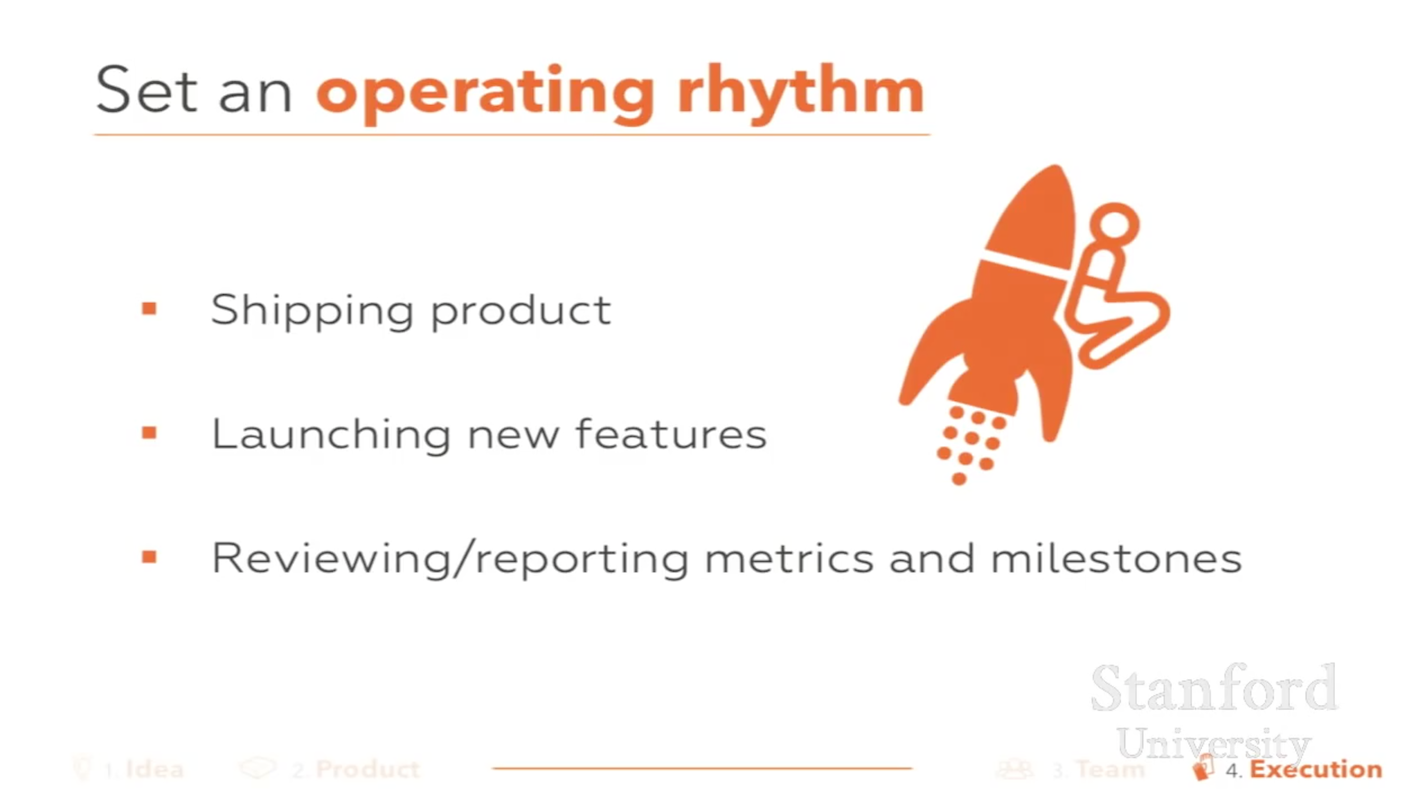
So, the working rhythm formed at an early stage serves as the engine of the company's growth and throughout its subsequent development. It is about regularly updating the product and its functionality and evaluating the business metrics on a weekly basis. With the metrics, the board of directors of the company will help you a lot, although it rarely makes a significant contribution to the strategic development of the business, it certainly helps to concentrate on the metrics and achieving the key stages of its development.
A critical factor that very often undermines the growth of a company is news from competitors. This factor is external and always has a noticeable effect on the company.
However, there is a good approach to this issue: just do not worry about competitors until they directly impact your business with a product that successfully competes with yours. Press releases are written much faster than program code, and creating a good product is even more subtle. Try to remind the whole team about this - it is your task as the founder of the company - not to jeopardize the whole business, having read good news from competitors.

I like one of Henry Ford’s quotes: “You should be afraid of those competitors who don’t think about you at all, only improving their own business.” In practice, such companies are almost never those who issue large, purely press releases. Usually these guys only bore everyone.
[ Translation Paul Graham’s next lecture]
